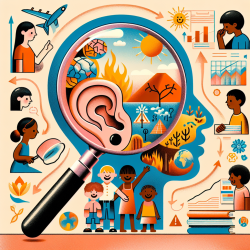Adverse childhood experiences (ACEs) are a significant public health issue, with nearly half of Americans exposed to at least one ACE before turning 18. These experiences can lead to a range of problems, from physical and mental health issues to impaired psychosocial functioning. A recent study titled "Area-level deprivation and adverse childhood experiences among high school students in Maryland" sheds light on how socioeconomic factors at the county level contribute to these adversities.
Key Findings from the Research
The study utilized data from the 2018 Maryland Youth Risk Behavior Survey/Youth Tobacco Survey, involving over 41,000 high school students. It examined five ACEs: food insecurity, parental substance use/gambling, parental mental illness, family member incarceration, and caregiver verbal abuse. The research found that county-level socioeconomic disadvantage was associated with three of these ACEs: food insecurity, parental substance use/gambling, and family member incarceration.
- Food Insecurity: Higher odds were observed in counties with greater socioeconomic deprivation.
- Parental Substance Use/Gambling: Similarly linked to higher deprivation indices.
- Family Member Incarceration: Strongly associated with socioeconomic disadvantage.
The study also highlighted that girls, older adolescents, and students identifying as Black, Latinx, or sexual/gender minorities (SGM) were more likely to report at least one ACE.
Implications for Practitioners
This research underscores the importance of addressing structural factors contributing to ACEs. Practitioners working with adolescents can enhance their interventions by considering the broader socioeconomic context affecting their clients. Here are some strategies to consider:
- Cultural Competency: Understand the unique challenges faced by different demographic groups and tailor interventions accordingly.
- Community Engagement: Collaborate with local organizations to address food insecurity and provide family support services.
- Mental Health Support: Implement screening for ACEs in schools and provide access to mental health resources for affected students.
The Need for Further Research
The findings from this study open up several avenues for future research. Understanding the mechanisms through which area-level deprivation affects ACEs can help develop targeted interventions. Researchers should consider longitudinal studies to explore causal relationships and investigate additional ACEs not covered in this study.
A Call to Action
The study's results highlight the urgent need for policies that address structural inequities contributing to adverse childhood experiences. Efforts should focus on improving food access, providing financial support to families, and reforming criminal justice practices that disproportionately affect marginalized communities.
To read the original research paper, please follow this link.










